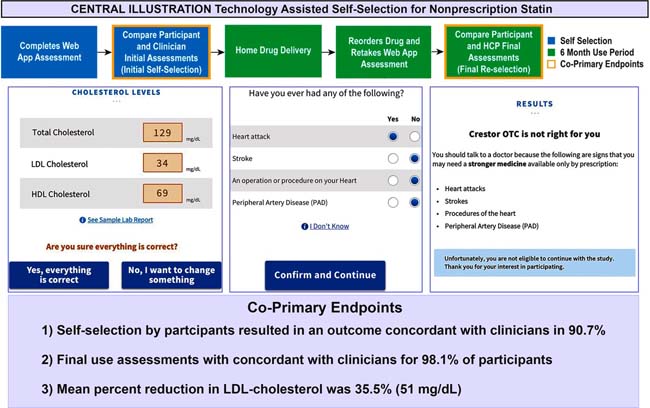The majority (>90%) of participants who used an innovative web application correctly qualified for over-the-counter statin treatment, closely matching the results of a physician´s eligibility assessment, according to findings from the TACTiC study. These were presented during a late-breaking clinical trial session at ACC.24 and simultaneously published in JACC.
This is the first experiment with a prescription statin that shows consumers can correctly self-select and take appropriate statins without requiring clinical evaluation or a prescription.

In this real-world prospective study, 1,196 participants (mean age 63, 39.6% women, 79.3% white, 11.7% Black, and 4.1% with limited literacy) interacted with the technology-assisted self-selection (TASS) web application to assess their eligibility for a statin. Their average calculated 10-year risk of atherosclerotic cardiovascular disease was 10.1%.
Participants were asked to enter demographic information, cholesterol levels, blood pressure, and concomitant medications. Based on their responses, the TASS app provided one of three possible outcomes for statin use: "Do not use," "Consult a doctor," or "Okay to use." Participants who received the result to consult a doctor or could use a statin continued in the study and virtually met with a physician to review their results and start a six-month treatment with a low dose (5 mg) of rosuvastatin.
For the co-primary endpoints, results showed high concordance (90.7%) between the TASS app outcome and the physician´s evaluation, and 98.1% had a final concordant result during treatment. The co-primary endpoint of mean percentage change in LDL-C was –35.5% (starting at 139.6 mg/dl at baseline). The final LDL-C was 88.1 mg/dL, an absolute reduction of 51.4 mg/dL. Serious adverse events occurred in 27 participants (2.3%), including one sudden death, but none were determined to be related to the study.
Adherence was high, with 95% based on direct pill counts for over-the-counter statin administration, and persistence was 98.5% over the six-month study.
"Although statins reduce adverse cardiovascular outcomes, less than half of eligible patients receive treatment," wrote study authors Steven E. Nissen, MD, et al. "Multiple prior attempts to address this issue through over-the-counter statins failed to gain regulatory approval due to concerns about inappropriate self-selection by consumers for whom statins may be unnecessary or unsafe." The authors highlight the findings of this study as a first step toward alleviating those concerns.
















